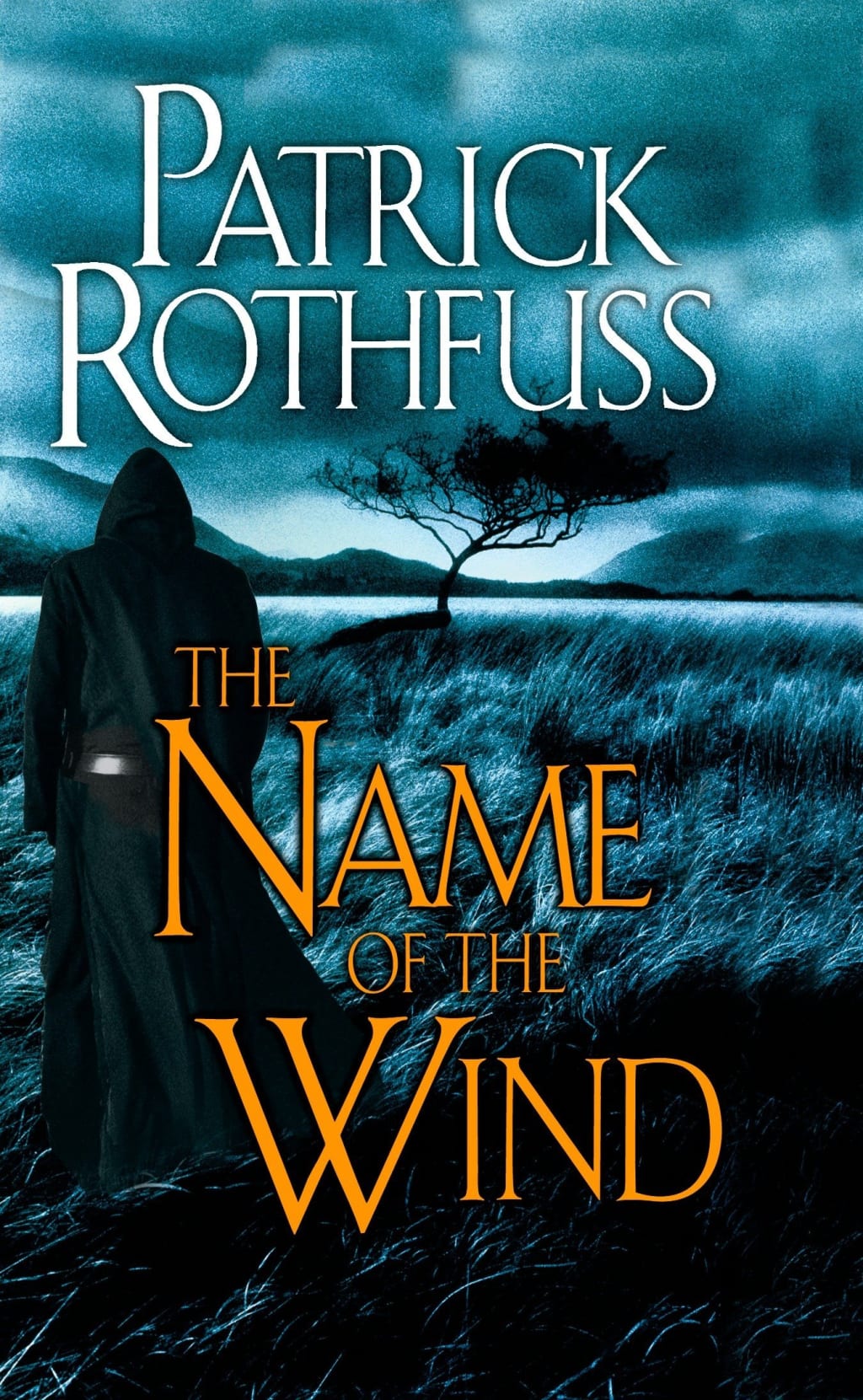The Name of the Wind: A review after two reads
Patrick Rothfuss' unfinished trilogy is one of a handful of fantasy series to breach the mainstream, yet many online seem to hate it. Did I?

When I first read The Name of the Wind by Patrick Rothfuss I loved it. It was a long, epic, fantasy romp with a new magic system and a ginger hero. (The ginger hero part isn't that important but my beard grows out red and I get made fun of for it, so a ginger hero feels nice.) It was great, and unlike some books I never felt the need to check reviews or read theories and breakdowns. But the Kingkiller Chronicles was popular enough to breach the mainstream, and so whether I wanted to or not over the years I began hearing other people's opinions.
I was shocked at the negativity.
There were myriad complaints about the series, and while I felt little about some of them, others rubbed me entirely the wrong way. So, last month I decided to reread the series and see if any of the common complaints held up in my own personal view.
Oh also heads up there will be some spoilers in this. If you plan on reading the books be warned. Skip to the section titled "Recap" to get my final, spoiler free thoughts.
The Mary Sue Complaint
This was perhaps the most common complaint I came across when browsing online. Kvothe is naturally gifted at everything he does, and so suspense is removed for the reader because they never have to worry about our protagonist. There's no tension, no struggle.
I think that complaint is dumb.
On my second read it was definitely more apparent just how easy things are for Kvothe, but it The Name of the Wind shirks one of fantasy's longest running and most exasperating traditions: the Chosen One.
Kvothe is not chosen for anything, he's an angry orphan who's looking for revenge, which is one of literature's greatest motivators albeit a little Batman-esque. To make up for this hidden supremacy that many fantasy heroes have, Kvothe is just talented. And if you've never met someone who is frustratingly good at almost everything they do, you should probably try to meet more people.
There are two more important reasons why I love that Kvothe is a capable protagonist.
1. The moment to moment scenes are more exciting.
People who complain that there's no tension because Kvothe is good at everything seem to have forgotten that the whole book is a frame tale. We already know Kvothe survives all this because he's the one telling the story. The pressure is already off to worry about how all of this is going to end, so we can sit back and watch how it unfolds.
2. We don't have to wait
Kvothe is good at the lute, he quickly picks up thieving, he's a natural born Arcanist, he has a quick wit, and therefore we hate him. Perhaps it's a relatability issue. I do not think I am anything like Kvothe, and I'm okay with that. I don't think anyone is supposed to be like Kvothe. He's literally a fantasy man.
But having him be great at things means we don't have to sit through the whole middle of the book turn into one long training montage (looking at you Eldest), or series of mistakes that grow more and more frustrating to read about until the hero finally makes a breakthrough at the very last second and is suddenly everything we were expecting them to be (*cough* Kaladin *cough*). We get to watch our hero actually adventure, instead of get the shit kicked out of him for two out of three acts. And that's fun for me.
The Unreliable Narrator
"Kvothe is clearly not that good at everything, right?"
Probably not, but maybe. Another common argument is that Kvothe is telling his own story and so he's just lying a whole bunch to make himself sound good.
This is very possible.
It's another argument against the Mary Sue complaint, if you're reading with an understanding that Kvothe is going to make himself sound awesome then you can pull back the curtain a little bit.
But what if he's not unreliable?
We see him fight demon spider things before he starts his story, we see him learn the Chronicler's code in a matter of seconds, would it be disappointing if he wasn't hyperbolizing his adventures?
Well, not to me.
My first read I was annoyed by the intermissions, the times when we were pulled back to the Wayside Inn for clearly made-up reasons. The second time around it became far more clear that the story in the Inn is the more interesting story. Not in the moment, but because everything we witness in the present is going to feed into Kvothe's redemption arc. We will hear him tell his own downfall and then witness him regain his lost splendour. And if he doesn't, then the end of the trilogy will be an absolutely glorious tragedy, woven finely into our own expectations of a Mary Sue's success.
This brilliance, the set up that we can undeniably only witness a magnificent redemption or a brutal failure, is only possible through the possibility that Kvothe is exaggerating.
The Misogyny
People find the book sexist in places. I am a man and therefore not at all qualified to offer anything but my own perspective on this, which is clearly heavily limited.
That being said.
There are two things to keep in mind before denouncing the books based on their possible sexit undertones. The first is that the series is still a step in the right direction compared to much of the fantasy genre. Dena is clearly strong and complex, despite the once or twice that Kvothe has to rescue her, and later in the series we witness a society that views women as inherently superior to men.
Are there still a lot of problems? Yes.
There's a lot of wish fulfillment in the second book, there's a lot of Kvothe saving the girl, there's a lot of unnecessarily gorgeous women (not that there's anything wrong with that, it just contributes to unrealistic modern beauty standards).
The second is that this is still a story told by a fifteen year old boy.
I'm not talking about Patrick Rothfuss (obviously) I mean we are still in a frame tale when Kvothe was going through puberty. It's gross, yes, but as a former fifteen year old boy I can attest that they think about girls a lot, and all of them seem beautiful all the time. It also brings us back to the narration: we don't see the same kind of attitudes towards women, or at least to the same extent, in the Inn scenes. Perhaps this is another storytelling feature that drives Kvothe's legitimacy down?
But again I am a man, and if you are a female and you thought the whole series was gross because Kvothe turned into a horndog lusting over one woman for a creepy amount of time, well I understand that as best I can.
Wait and Length
This one's pretty simple, and it happens to be the same frustration that Game of Thrones readers have faced for years as well.
Where's the next book.
Rothfuss seems intent on making the series a trilogy, despite the fact that there's clearly a ton that has to happen between the triumphant Kvothe returning to the University and the innkeeper at the Wayside. But should it really take this long? For a story about a Mary Sue that breezes through everything?
Yeah, if you want it to be right.
When I sat down to read the series for the second time I was expecting a multiple month slog through the thousands of pages that make up the two books.
It took me two weeks.
A friend of mine described rereading the series as a guilty pleasure, because the writing is so indulgent, so carefully perfect that it's almost disgusting. Now picture Rothfuss putting the care that he puts into every word, in the last book of his legacy.
That takes time.
But above and beyond that the man is now wealthy. He doesn't need to write anymore if he doesn't want even though we might want him to. Add to that the fact that the second book ends in quite a happy place, and if he's planning a tragedy following through with it could be just as devastating to the writer as reader.
Is it frustrating? Yes, but it's also understandable.
Recap
The Name of the Wind is long, it's a teenage boy fantasy and it's protagonist is capable hero. Those points are its greatest strengths and its weakest links. Whether or not you are a fan of fantasy, this series is one of the most engaging, perfectly crafted character studies I have ever read. Even if you think these points make it weak, it is still worth reading for the simple act of examination. But without any work on your part, Patrick Rothfuss will thrust you deep into a world that is new, fresh, and above all, fantastic.
About the Creator
Rory Hoffman
Rory is a freelance writer and editor from Vancouver, Canada. He graduated with a degree in Political Science and Creative Writing from the University of British Columbia. Adores the fantasy genre and any story that gives that vibe.






Comments
There are no comments for this story
Be the first to respond and start the conversation.